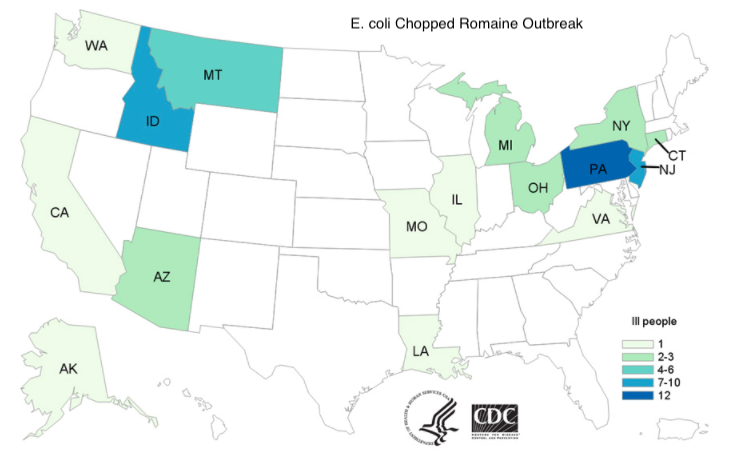The food safety attorneys at Pritzker Hageman law firm can be contacted about a lawsuit for E. coli from lettuce. A lawyer can help you and your family get compensation and justice.
Yes, I want a free consultation with an E.coli lawyer.
The E. coli outbreak linked to romaine lettuce has expanded to include 18 more cases and five more states: Alaska, Arizona, California, Louisiana, and Montana, since the last update from the Centers for Disease Control and Prevention (CDC) on April 13. Thirty-one of the 53 confirmed case-patients now being reported from 16 states have been hospitalized, five of whom have developed hemolytic uremic syndrome (HUS), a form of kidney failure associated with E. coli infections.
The people sickened in this outbreak range in age from 10 to 85 years old with a median age of 34. Seventy percent of the patients are female. They report onset of illness dates ranging from March 13 to April 6. The case count by state is as follows: Alaska (1), Arizona (3), California (1), Connecticut (2), Idaho (10), Illinois (1), Louisiana (1), Michigan (2), Missouri (1), Montana (6), New Jersey (7), New York (2), Ohio (2), Pennsylvania (12), Virginia (1), and Washington (1).
HUS Kidney Failure
Between 5 percent and 10 percent of people with E. coli infections develop HUS, a life-threatening complication that causes kidney failure. HUS symptoms usually develop about a week after the first symptoms of an E. coli infection. They include fever, abdominal cramps, fatigue, pallor, decreased frequency of urination and small, unexplained bruises or bleeding. Anyone with these symptoms needs to seek immediate emergency medical care.
Pritzker Hageman is one of the few law firms in the country with extensive experience with HUS cases including the biggest verdict in American history for a victim of HUS. To contact a food poisoning attorney for a free, no-obligation consultation, click here.
Most Patients Ate Restaurant Salads
Health officials have interviewed 43 of the people who have been sickened. Forty-one of them, 95 percent, reported eating chopped romaine lettuce in the week before they became ill. And most of those respondents said they ate the salad at a restaurant.
Restaurants contacted by outbreak investigators reported using bagged, chopped romaine lettuce to make salads. The names of these restaurants have not been made public by health officials, but a lawsuit filed on behalf of a person in New Jersey who became ill names Panera.
Recalls and CDC Advice for Consumers
Investigators from the U.S. Food and Drug Administration (FDA) have determined that the lettuce associated with this outbreak was grown in Yuma, AZ, an area of the country that produces a significant amount of the nation’s romaine lettuce during the winter months. Several recalls have been issued.
The CDC advises that consumers throw away any romaine lettuce grown in Yuma, AZ including whole heads, hearts of romaine and bags of chopped romaine lettuce or bagged salad mixes containing chopped romaine. Consumers should not buy any romaine lettuce or order salads at restaurants containing romaine lettuce unless they can verify that it was not grown in Yuma, AZ.
Anyone who has eaten chopped romaine lettuce recently and has symptoms of an E. coli infection, which include nausea, abdominal cramps and diarrhea that can be bloody, should follow these steps, the agency says:
- See a doctor.
- Write down what you ate in the week before your symptoms began.
- Report your illness to the health department.
- Help public health investigators by answering questions about your illness.
This post was updated on April 20 to include updated advisory information from the CDC.
